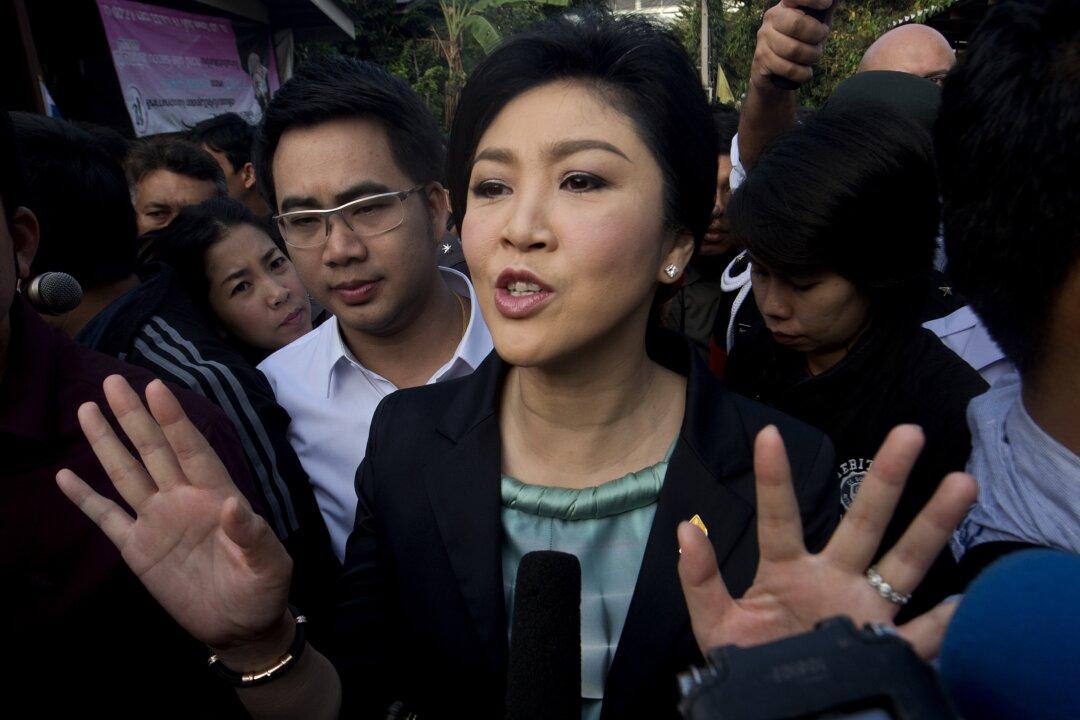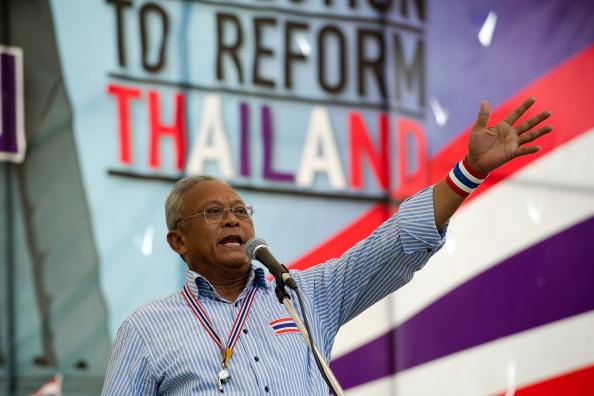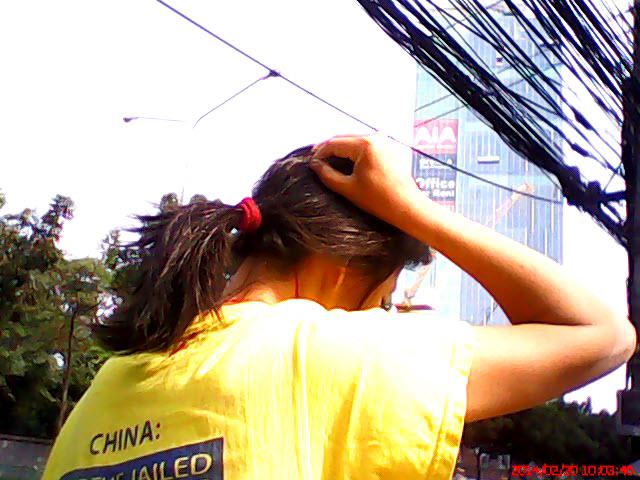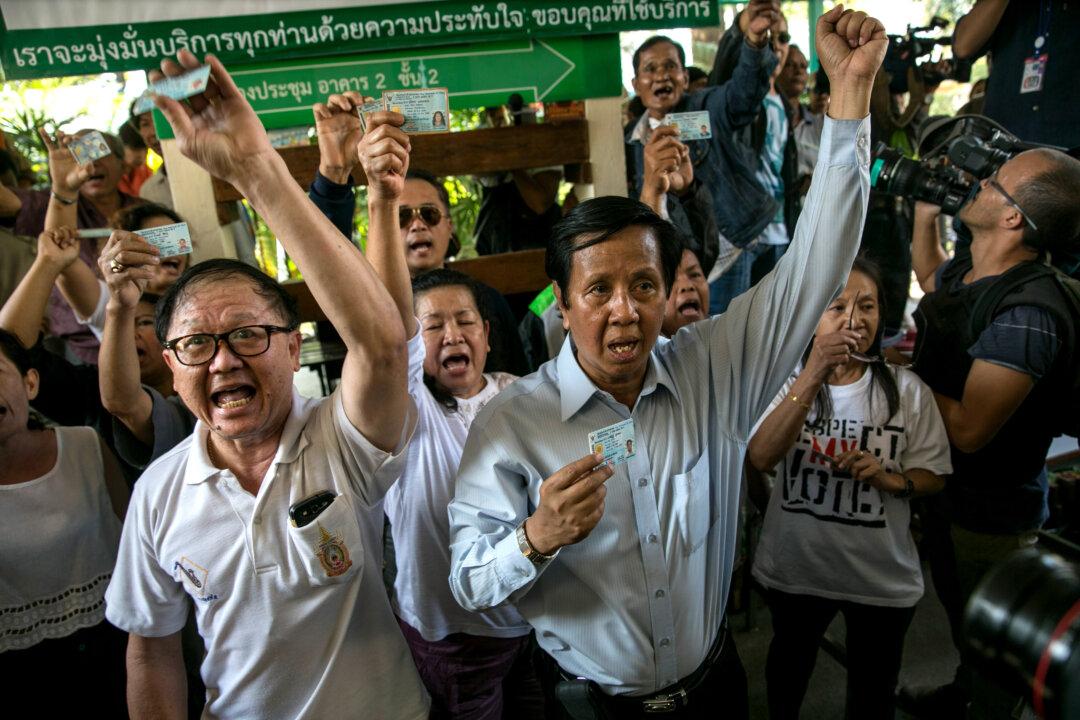BANGKOK—Images of Thai Prime Minister Yingluck Shinawatra mistakenly putting her ballot paper into the wrong voting box made the front page of more than one Bangkok newspaper on Monday.
The Prime Minister’s voting gaffe during Sunday’s general election was jumped on by some critics, but considering the array of hurdles she and her caretaker government currently face—it’s the least of her worries.
Among the issues the 46-year-old Yingluck needs to manage is that her snap elections—due to polling disruptions caused by anti-government protesters—have been deemed unfinished. With the elections failing to acquire sufficient seats to form a government, by-elections are now needed to make up the numbers. This means it may be a further six months until a new parliament can be formed.
Judicial Coup
Yingluck also faces the very real possibility that the election—which was boycotted by the pro-establishment opposition Democrat party–could be ruled null and void by the Constitutional Court.
The Democrats are planning to use the court to nix the election because they say the election shouldn’t have been held during the state of emergency which was imposed by Yingluck last month. The opposition is also seeking to have court to disband the ruling party.
Dr. Paul Chambers, from the Institute of South East Asian Affairs at Thailand’s Chiang Mai University, said there are also two other court actions against the government which add to the probability that Yingluck will be ousted by a “judicial coup.”
“Parallel to this process of the Constitutional Court, there is the National Anti-Corruption Commission impeaching 308 pro-Thaksin Members of Parliament for voting for an amendment and they’re going to perhaps impeach Yingluck in regards to the rice–pledging scandal,” Dr. Chambers said.
The first case referred to politicians—predominantly members of Yingluck’s Puea Thai party—who attempted to amend the Thai constitution to make the semi-appointed Senate a fully elected chamber, a move which has been ruled unlawful. The second referred to the government’s costly rice scheme which has been dogged by corruption allegations.
Protracted Crisis
Thailand’s courts have in the past forced out governments allied to Yingluck’s divisive billionaire brother, Thaksin Shinawatra. The most recent judicial coup occurred in 2008, the same year that saw yellow-shirt anti-Thaksin protesters take over Bangkok’s main international airport for a week.
Most commentators say another judicial coup or a military coup will only inflame the protracted political crisis that has intermittently beset the South East Asian nation over the past eight years.
“A judicial coup—or any other forceful removal of the current government—would only make things worse,” said Saksith Saiyasombut, a writer and Thai political commentator.
“The protesters might be happy in the short-term, but the red-shirt pro-government supporters would not simply accept that anymore like in the past,” he said. “It will lead to further protests and given the heated tensions, things can go quickly out of hand and descend further into chaos.”
Army Avoiding Coup
Dr. Chambers said he believed that, at present, the army wants to avoid conducting a coup and Thailand’s army chief, General Prayuth Chan-ocha, has purposely kept his military on the sidelines.
If a judicial coup was to happen instead, Dr. Chambers said it would take the pressure off General Prayuth who retires October this year.
“When he retires he’d prefer to not have legal morass hanging over his head that he led a military coup,” said Dr. Chambers.
Since 1932, Thailand has had 18 military coups. The last one occurred in 2006 when Thaksin was Prime Minister.
Thaksin currently lives abroad in self-imposed exile to avoid corruption changes which he says are politically motivated. Opposition to an amnesty bill that would have allowed him to return to Thailand and avoid criminal charges was the initial focus of the mass anti-government protests that began three months ago in Bangkok.
Despite the amnesty bill being quashed, the protesters continued their rallies with a more daring goal—throwing Yingluck and Puea Thai out of government.
Deep Running frustrations
The anti-government protesters are a mixture of royalists, upper and middle-class Bangkokians, southerners and anyone else who despises the Shinawatras who they allege have been involved in corruption of a massive scale. They say that Thaksin dictates to his younger sister and the government via Skype.
The protesters are also frustrated by how electorates in the north and north-east of the country, continually vote pro-Thaksin parties back into power.
“Bangkok’s elites and middle classes now find themselves in an electoral democracy where they seem to be structurally in the minority, and don’t see any way out of if but to overthrow electoral democracy itself,” said Marc Saxer, the resident director of the Friedrich-Ebert-Stiftung Thailand office.
Shadow Forces Behind the Protests
The anti-government protesters are led by 64-year-old Suthep Thaugsuban, a former senior member of the Democrats who is himself tainted by corruption allegations. For the past several months he has called on Yingluck and her government to step down so an unelected interim government can carry out reforms before another election is held.
Part of their agenda he has stated is to root out the influence of the “Thaksin regime”.
Dr. Chambers believes that Suthep and other protest leaders are willing to engage in violence to reach their goals but he did not think they’re ultimately in charge of the protest movement.
“Behind the proxy of Suthep we have shadowy, extremely powerful interests that have decided that it’s time for Yingluck to go and they’re not going to stop for anything to see her out,” said Dr. Chambers.
During their protests over the past several months, the demonstrators have taken control of key government buildings and a number of Bangkok’s main road intersections.
There have been clashes on the streets resulting in ten deaths and hundreds of injuries. An hour-long shootout erupted between red-shirt pro-government supporters and anti-government protesters on the eve of Sunday’s election.
“It is obvious that both sides have armed elements in their ranks which have engaged in a number of clashes already,” said Sunai Phasuk from Human Rights Watch.
Hard core red shirt leaders have declared they’ll take up arms if Yingluck’s government is forced out. Some of them have also stated that Thailand should be partitioned.
The red shirt movement was involved in the most violent episode of this prolonged saga when members clashed with the military in Bangkok four years ago. The red shirts were then pressuring the unelected Democrat party-led government to call an election. Ninety-two people were killed, mostly red shirts, while scores of prominent buildings in the city’s business areas were set ablaze.
Eventually a general election was called, and in July 2011 Yingluck, then a political novice, was voted into power.




